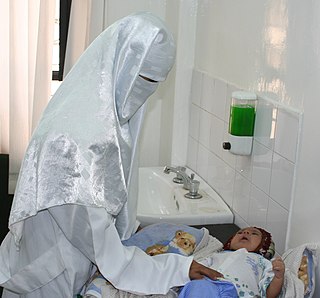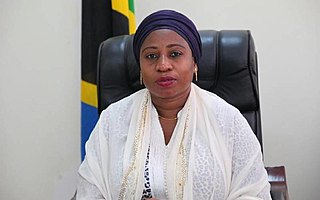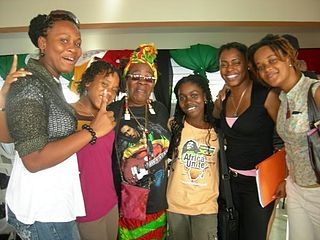Gender equality, also known as sexual equality or equality of the sexes, is the state of equal ease of access to resources and opportunities regardless of gender, including economic participation and decision-making; and the state of valuing different behaviors, aspirations and needs equally, regardless of gender.

Human rights in Uganda have trended for the past decades towards increasing harassment of the opposition, cracking down on NGOs which work on election and term limits, corruption, land rights, environmental issues, womens, children and gay rights. In 2012, the Relief Web sponsored Humanitarian Profile – 2012 said Uganda made considerable developments Since at least 2013 the Freedom in the World report by Freedom House has identified Uganda as a country considered to be "Not Free".There are several areas of concern when it comes to human rights in Uganda, and the "Not Free" classification is due to both low political rights and civil liberties rankings.
Equality Now is a non-governmental organization founded in 1992 to advocate for the protection and promotion of the human rights of women and girls. Through a combination of regional partnerships, community mobilization and legal advocacy the organization works to encourage governments to adopt, improve and enforce laws that protect and promote women and girls' rights around the world.

The age of consent in Africa for sexual activity varies by jurisdiction across the continent, codified in laws which may also stipulate the specific activities that are permitted or the gender of participants for different ages. Other variables may exist, such as close-in-age exemptions.

The political, social, and economic status of women in Jordan has varied based on the legal, traditional, cultural and religious values at the time. Women's rights and experiences in Jordan also depended on other factors, such as class, place of origin, religion, and other factors. These influences also vary by region, with the Bedouins, Druze, and Chechen peoples each having their own distinct cultural practices. In recent years, there have been significant changes in women's participation in politics, as well as increased involvement in the arts and sports. However, according to the 2020 World Economic Forum's Global Gender Gap Index, which measures economic behavior, educational attainment, health and survival, and political empowerment, Jordan ranks 138 out of 153 nations in terms of gender equality.

The status of women in Nepal has varied throughout history. In the early 1990s, like in some other Asian countries, women in Nepal were generally subordinate to men in virtually every aspect of life. Historically, Nepal has been a predominantly patriarchal society where women are generally subordinate to men. Men were considered to be the leader of the family and superior to women. Also, social norms and values were biased in favor of men. This strong bias in favor of sons in society meant that daughters were discriminated against from birth and did not have equal opportunities to achieve all aspects of development. Daughters were deprived of many privileges, including rights, education, healthcare, parental property rights, social status, last rites of dead parents, and were thought to be other's property and liabilities. In the past century, there has been a dramatic positive change in the role and status of women in Nepal, reducing gender inequality. While the 1990 Constitution guaranteed fundamental rights to all citizens without discrimination on the basis of ethnicity, caste, religion, or sex, the modernization of society, along with increased education of the general population, have also played an important role in promoting gender equality. The roles of women have changed in various ways in the modern Nepalese society.

The status and social roles of women in Mali have been formed by the complex interplay of a variety of traditions in ethnic communities, the rise and fall of the great Sahelien states, French colonial rule, independence, urbanisation, and postcolonial conflict and progress. Forming just less than half Mali's population, Malian women have sometimes been the center of matrilineal societies, but have always been crucial to the economic and social structure of this largely rural, agricultural society.

The status of women in Taiwan has been based on and affected by the traditional patriarchal views and social structure within Taiwanese society, which put women in a subordinate position to men, although the legal status of Taiwanese women has improved in recent years, particularly during the past two decades when the family law underwent several amendments.

Women in Yemen have historically been placed at a disadvantage due to their gender, with a highly patriarchal society. Although the government of Yemen has made efforts that will improve the rights of women in Yemen, many cultural and religious norms, along with poor enforcement of this legislation from the Yemeni government, have prevented Yemeni women from having equal rights to men.
Women in Cambodia, due to the influence of the dominant Khmer culture, are traditionally expected to be modest and soft-spoken. They are to be well-mannered, industrious, and hold a sense of belonging to the household. It is expected that they act as the family's caregivers and caretakers, financial administrators, and serve as the "preserver of the home". As financial administrators, women can be identified as having household authority at the familial level. Khmer women are expected to maintain virginity until marriage, become faithful wives, and act as advisors to their husbands. Women in Cambodia have also be known as “light” walkers-- "light" walking and refinement of the Khmer women is further described as being "quiet in […] movements that one cannot hear the sound of their silk skirt rustling".

Samia Suluhu Hassan is a Tanzanian politician who has served as president of Tanzania since 19 March 2021. She is the first woman to serve in the position. She previously served as vice-president of Tanzania from 2015 to 2021, from which she ascended to the presidency following the death of her predecessor, John Magufuli.

Ummy Ally Mwalimu is a Tanzanian politician belonging to the ruling Chama Cha Mapinduzi (CCM) party. She is currently a Member of Parliament for Tanga Constituency and also serves as the Minister of Health, Seniors and Children. She has held various cabinet positions since 2010. She is a third-term Member of Parliament, firstly appointed to a seat reserved for women in the parliament of Tanzania in 2010.

Women in Trinidad and Tobago are women who were born in, who live in, or are from Trinidad and Tobago. Depending from which island the women came, they may also be called Trinidadian women or Tobagonian women respectively. Women in Trinidad and Tobago excel in various industries and occupations, including micro-enterprise owners, "lawyers, judges, politicians, civil servants, journalists, and calypsonians." Women still dominate the fields of "domestic service, sales, and some light manufacturing."

The term 'political participation' has a very wide meaning. It is not only related to 'Right to Vote', but simultaneously relates to participation in: decision-making process, political activism, political consciousness, etc. Women in India participate in voting, run for public offices and political parties at lower levels more than men. Political activism and voting are the strongest areas of women's political participation. To combat gender inequality in politics, the Indian Government has instituted reservations for seats in local governments.
Traditional gender roles in Egypt are prevalent and clearly defined. These roles are largely associated with traditional Islamic family structures, wherein women's roles are closely tied to the domestic sphere and men's roles tied to the public sphere. Gender roles are based on assumed biological differences between the sexes and can lead to dramatically different life experiences as well as opportunities and outcomes for individuals. Consequently, when looking at a number of indicators, women often find themselves disadvantaged relative to men.

Niue is a country in the South Pacific Ocean with an estimated population of 1,190. Since 1974, it has been self-governing in free association with New Zealand. Niue controls its own internal affairs, while New Zealand retains responsibility for its defence and external relations and is required to provide necessary economic and administrative assistance.
The Federated States of Micronesia is a United States Associated State consisting of 4 states across the Western Pacific Ocean. The estimated population in 2015 was 105,216. Formerly the FSM was a part of the Trust Territory of the Pacific Islands (TTPI) but in 1979 formed its own constitutional government. FSM has a written constitution which took effect in 1979 and has been amended only once in 1990. By virtue of membership in the United Nations, the FSM abides by the UN Declaration of Human Rights (UDHR). Key human rights concerns in FSM include judicial delays, government corruption, discrimination against women, domestic violence and child neglect.
Examples of Gender inequality Papua New Guinea includes poverty, violence, limited access to education and health care, and witch hunts. Cases of violence against women in PNG are under reported. There is also a lack of services for women who experience violence. There are reports of sexual abuse by police officers, on arrest and whilst in police custody. These incidents lack documentation or investigation, consequently, perpetrators are rarely prosecuted or punished. The government of Papua New Guinea (PNG) has introduced legislation to combat these issues, though with limited success.

In 2017, 1.1 million women were living in Lesotho, making up 51.48% of the population. 33% of women are under 15 years of age, 61.4% are between 15 and 64 years old and 5.3% are over 64 years old. They received full legal status in 2008 with the passage of The Lesotho Bank Savings and Development Act of 2008. Women in Lesotho die at a disproportionate rate from HIV/AIDs. Historically, women have wielded power as heads of households, with control over household financial decisions. The government has taken steps to ensure more equal representation of genders in government with quotas, and women in Lesotho are more highly educated than men. Still, domestic abuse, sexual violence, lack of social mobility, and aforementioned health crises are persistent issues. Social and economic movements, like the mass immigration of men to South Africa, and the rise of the garment industry, have contributed to both the progress and problems facing women in Lesotho today.

Feminism in Indonesia refers to the long history of discourse for gender equality to bring about positive social change in Indonesia. The issues women in Indonesia currently are facing include gender violence, underage marriages, and lack of representation in the political system. Feminism and the women's right movement began during colonial Indonesia under Dutch rule and were spearheaded by the national heroine Kartini, a Javanese noblewoman who advocated for the education of all women and girls regardless of social status. In the early 19th century, women's rights organizations and movements were allowed to developed under Budi Utomo, the first Indonesian Nationalist organization. Modern day Indonesian feminism include and are influenced by both fundamentalist and progressive Islamic women's organizations.














